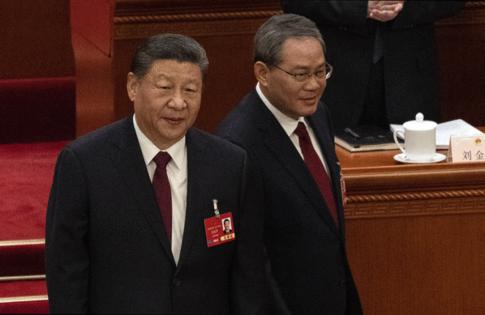Xi is making China's premier his top messenger on world stage
Published in News & Features
Three years ago, Chinese Premier Li Qiang took on a role largely stripped of its former glory. Now, in a surprise twist, he’s becoming President Xi Jinping’s top emissary on the world stage.
When China’s No. 2 official steps out in Johannesburg at the first Group of 20 leaders’ meeting ever held in Africa this weekend, it’ll mark his third stint representing Xi at a major conference. It’s a role Li debuted at the G20 leaders’ summit in India two years ago, and then reprised this summer at a BRICS top-level gathering in Brazil.
Li’s growing international profile stands out in Chinese politics. While previous premiers were given greater control over steering the world’s second biggest economy, and had memorable moments with foreign dignitaries at home, none represented their president at overseas summits such as the G20.
The shift comes as Xi dials back his own travel. The 72-year-old has remained in Asia this year, with the exception of traveling to Russia — his most geographically curtailed schedule outside COVID. Li’s larger global footprint shows that, despite Xi’s sweeping purge of ministers and top military generals, reliance on his inner circle of loyalists appears to be only growing.
While China’s top leader is delegating abroad, there’s no suggestion anyone is being groomed for succession, with Xi widely expected to clinch a fourth term at the next congress in 2027.
“Xi is prioritizing summits where China holds outsized influence or are close to home,” said Neil Thomas, a fellow for Chinese politics at the Asia Society Policy Institute’s Center for China Analysis. “As Xi grows older and more secure in his grip on power, he seems increasingly willing to delegate.”
“Li Qiang has effectively become Xi’s primary diplomatic interlocutor,” he added.
Xi’s absence at the G20 comes as President Donald Trump leads a U.S. boycott of this year’s event, calling the choice of South Africa a “total disgrace” as he makes unfounded claims of persecution against White people in the country. Russian President Vladimir Putin’s travel is limited by an International Criminal Court arrest warrant, while the leaders of Argentina and Mexico are also giving it a pass.
In 2023, Xi snubbed proceedings in New Delhi after deadly border clashes complicated ties with India. His considerations this time are different. China for decades has courted African countries as a counterweight to the U.S.-led world order, lending tens of billions of dollars for infrastructure building that cemented influence. Xi announced “zero-tariff treatment” for all 53 African nations with diplomatic ties to Beijing this year, in stark contrast to Trump’s treatment of the continent.
China was also an early backer of the African Union’s bid to join the G20, while trade with the continent has been soaring. African debt and Beijing’s role as a creditor will likely be on the agenda this week, with Li visiting Zambia — one of the region’s main holders of Chinese loans and home to a recent disaster at a Chinese-owned copper mine — on his way to the summit.
“I don’t think Xi’s absence suggests that China is neglecting the Global South,” said Yun Sun, director of the China Program at the Stimson Center. “Attending large summits with too many different regions and interests represented is less effective or efficient than the smaller China-subregion cooperation mechanisms.”
South Africa’s Foreign Minister Ronald Lamola said at the inaugural Bloomberg Africa Business Summit in Johannesburg this week that his nation was “not disappointed” Xi wouldn’t attend.
“It has never even happened in the G20 itself that you will find 100% attendance of heads of state,” he said. “China, at all the multilateral platforms, has been represented by Premier Li,” he added, noting President Cyril Ramaphosa’s attendance of last month’s ASEAN summit in Malaysia alongside China’s No. 2.
The absence of Trump and Xi could provide an opportunity for Indian Prime Minister Narendra Modi to shape the agenda of the Global South, according to Harsh Pant, a professor of international relations at King’s College, London. The U.S. is looking inward, but Xi’s skip is harder to explain given China’s interest in Africa and South Africa’s tilt to Beijing, he said. “Maybe there are domestic reasons behind the Chinese president’s decision,” Pant added.
While Xi once traveled more than the U.S. president, he now prefers what Beijing calls “home-court diplomacy.” During a back-to-back military parade and security summit this summer, Xi had high-profile photo opportunities with leaders including Putin, Modi and North Korea’s Kim Jong Un — all without leaving China. Following those events, the state-run People’s Daily published a feature detailing Xi’s intense six-day schedule, in an apparent attempt to deflect criticisms he looked tired during the pageantry.
“Plenty of leaders are willing to travel to China, and he’d rather have them come to him,” said Bloomberg Economics’ Jennifer Welch. “Over the past few years, China has made very good use of its senior officials in international diplomatic efforts.”
When filling in for Xi, however, Li hasn’t always enjoyed the same level of engagement as his boss, possibly because he’s not a full counterpart to other heads of states. Li stayed low profile during his first G20 in India, for example, securing just four bilateral meetings compared to the 11 that Xi held one year earlier.
Still, Li’s platform as an economic official could be useful in keeping talks away from more sensitive diplomatic issues, said Dylan Loh, associate professor at Nanyang Technological University in Singapore.
“Sending Li Qiang will help in some ways ensure the task remains economically focused,” he added.
_____
(With assistance from Reto Gregori and Sudhi Ranjan Sen.)
_____
©2025 Bloomberg L.P. Visit bloomberg.com. Distributed by Tribune Content Agency, LLC.







Comments